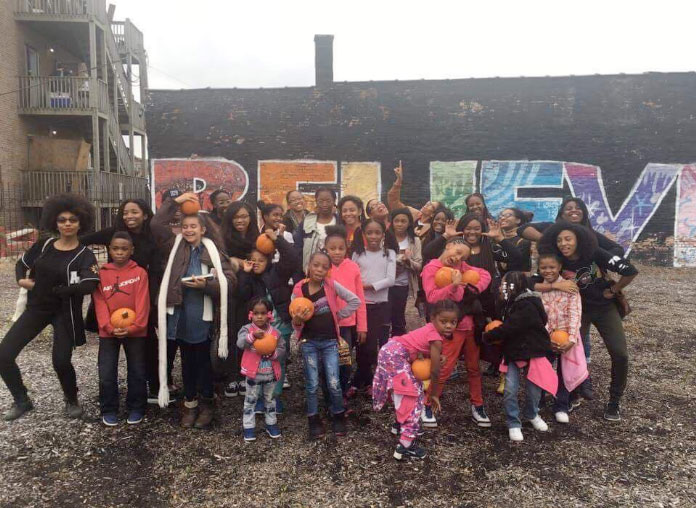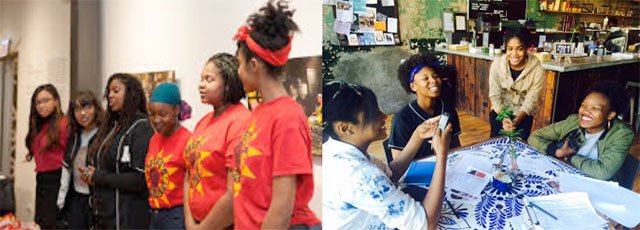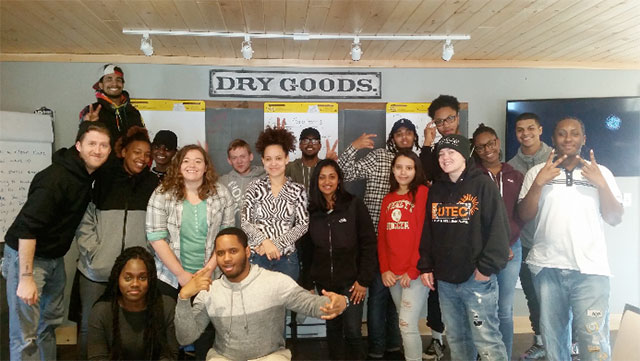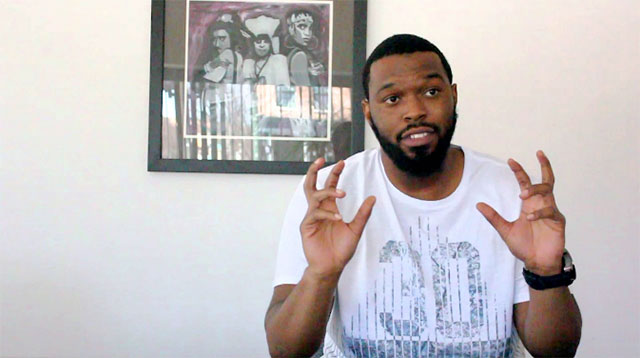
Honest, paywall-free news is rare. Please support our boldly independent journalism with a donation of any size.
There’s a growing movement to change the criminal punishment system in this country, and it’s being led by men and women who’ve lived it. As the National Council for Incarcerated and Formerly Incarcerated Women and Girls puts it: “Nothing about us without us.”
There is also a growing movement throughout the country aiming to elevate the voices of another group that is often marginalized. And this group, while impacted by crime, has often been left out of the discussion. Young people are speaking out about the impacts on their lives of racism, crime, mass incarceration and criminal legal policies, and in addition to voicing their issues, they are demanding change.
There’s Chicago’s Assata’s Daughters, a grassroots organization in which young Black women, as part of the larger Black Lives Matter movement, are building new ways to “escalate, deepen and sustain this movement for collective liberation,” emphasizing educational initiatives and actions with Black girls. There’s Teens Leading the Way, a Massachusetts youth-led coalition that empowers young people to create change through policy-making. And from inside prison, youth like Da’Quon Beaver are utilizing peer support systems and lobbying for revisions in practices behind bars. These same youths are becoming justice consultants, leaders in organizations and members of policy-making boards once they are released.
Elevate the Voices of Young People: Assata’s Daughters
In 2015, the Pittsburgh Foundation piloted a study with 53 youth during an eight-month period and found, “Youth are only ‘at-risk’ when they are inadequately served by the adults in systems who surround them.” Perhaps if we listened more to our youth and their ideas for solving the problems they face, fewer of them would be incarcerated.
While the number of youth imprisoned in the United States has been dropping in the past 10 years, as of 2017, according to the Prison Policy Initiative, our country still locks up 34,000 in youth prisons, 4,500 in adult prisons and 20,000 in residential facilities.
While more than 90 percent of juveniles say they’ve committed some minor crime, clearly not all of these youth are criminalized. According to an email from Joshua Rovner, who is juvenile justice advocacy associate at the Sentencing Project, “We’re still locking up almost 12,000 kids every day for incredibly low-level offenses. More than 2,500 are held on status offenses — things like skipping school or violating curfews. And there’s more than 9,000 kids who are held for technical violations of their probation, which could mean something as small as that same type of status offense.”
But while the national rate of incarceration between 2003 and 2013 dropped almost 41 percent, according to the Sentencing Project, in that same period, “The racial gap between black and white youth in secure commitment increased by 15 percent.” In Chicago, where Assata’s Daughters was born, Black children and youth comprised more than 79 percent of juvenile arrests from 2013 through 2014 according to “Arresting Justice: Juvenile Arrests in Chicago, 2013, 2014” by Mariame Kaba.
Racial justice is fundamental to the work of Assata’s Daughters. According to its website, it “carries on the tradition of radical liberatory activism encompassed by Assata Shakur.” Assata’s Daughters was cofounded by Page May, a Chicago organizer and middle school teacher who talked to Truthout about her goals from the group’s beginning in 2015. Assata’s Daughters developed educational programs, and “intentionally focused on Black girls because they were erased from a collective understanding of who is in leadership,” she said, adding that, “Young people have to identify problems in their community and develop hard skills. … Change happens not through a moral argument but through a direct threat to the system, and it must be rooted in people directly impacted.”
 Completion of a training and working on a campaign. Alizah Vernon is in the middle (L) and on the far right (R). (Photos: Courtesy of Page May.)
Completion of a training and working on a campaign. Alizah Vernon is in the middle (L) and on the far right (R). (Photos: Courtesy of Page May.)
“I got involved [with Assata’s Daughters] a year ago because so much violence was happening to people who looked like me,” said 16-year-old Alizha Vernon in a telephone interview. “When you’re young, you know about politics, but you can’t vote. Assata’s Daughters lets you know what you can do and pushes you to do it — I really appreciate that.”
Vernon helped run a campaign last Christmas enlisting teachers and students in approximately 10 classes at her high school to send holiday cards to kids in juvenile facilities. They provided cards and markers, and she helped to collect, read through and get the cards mailed. “It made me feel really good because I know how lonely it can be, and the cards let kids know people were thinking about them.”
Vernon said she particularly liked that Assata’s Daughters educates and trains participants in direct action. For example, during the week, participants might learn about the history of the prison industrial complex, and then later hand out information in the Washington Park area of Chicago to help people get free lawyers. Recently, she said they met weekly to learn about environmental justice, and on one weekend, took a field trip to a neighborhood in Chicago where there were landfills and toxic waste — and where they also planted flowers while talking to people in the neighborhood about how they could help them.
The education component and activism component are very important, echoed May, who said she “strives to build a world without police or prisons.” Meanwhile, she said, “We have lots of education to do and needs that have to be addressed. How do we build up alternatives? We have to help kids develop a world view.”
Teens Leading the Way
 A Teens Leading The Way 2017 group photo. Coy Walker is the tallest in the photo, and McMillan is to his right. They are at a TLTW retreat in New Hampshire. (Photo: Courtesy Coy Walker.)
A Teens Leading The Way 2017 group photo. Coy Walker is the tallest in the photo, and McMillan is to his right. They are at a TLTW retreat in New Hampshire. (Photo: Courtesy Coy Walker.)
Teens Leading the Way (TLTW) creates and sustains campaigns to bring about social change on a statewide level. The United Teen Equality Center in Lowell, Massachusetts, is its home base, and the group has branches across Massachusetts.
Both Chaurice McMillan and Coy Walker began working with TLTW when they were teens, and immediately were excited by its advocacy efforts. The first campaign that caught both their attention was youth criminal record expungement. The campaign came directly from the needs of TLTW youth who either had criminal records, or friends with records. The thinking behind an expungement law is to create a process by which certain nonviolent juvenile crimes can be removed from a criminal record. According to TLTW’s website, having a record impacts “steady employment, higher education, accessing stable living,” and it keeps young people from “moving past a stigma of being systemically labeled a criminal after the completion of their sentence.”
About expungement, Walker told Truthout, “I think it’s important because it is not right for people who made a mistake when they are young not to be able to enter society.” He added, “I have some family members and people I work with who have been to jail, and it’s hard to see them dealing with the obstacles they have to overcome when they get out of prison, when they really do regret and just want to move on.”
Walker, who recently completed his first semester at Suffolk University, said, “When I was younger, I was selected to do a program where you did community service, and got to meet the governor at the time, Gov. Deval Patrick. I realized that if you put yourself in the face of politicians, then they are forced to address you and take you seriously. Something that resonates for me: If you want to change something, keep going for it.”
McMillan, who is now at Lesley University studying education, said in a phone interview that she too wants juvenile records erased. “To have your whole life determined before the age of 18 seems really ridiculous,” she said. Currently 83 sponsors are supporting a variety of legislation in Massachusetts that call for young adult and juvenile record expungement.
McMillan learned about the school-to-prison pipeline in high school and soon after, began working for a TLTW after-school math program. But the main thrust of TLTW is creating and maintaining campaigns to bring about social change on the statewide level. This includes direct lobbying of state representatives and senators. And this is what excited McMillan. She said, “Every time I go to a meeting we learn something new about policy making.” She finds that an enormous amount of work goes into legislative lobby days such as social media outreach, creating stickers and T-shirts, and most importantly lobbying the state legislators.
“I never thought that I would be doing policy work or dealing with politics because I never thought I’d have the power,” McMillan said, adding, “Now I’ve learned that anyone can be a part of it.”
Walker put his advocacy this way: “This is a calling.”
From Incarceration to Community Organizer
 Photo of Da’Quon Beaver posted by Rachel Williams on Youtube, March 2016.
Photo of Da’Quon Beaver posted by Rachel Williams on Youtube, March 2016.
Da’Quon Beaver, the Washington, DC, Campaign for Youth Justice’s youth and community outreach specialist, began his political education in prison. In a phone interview, he talked of how a robbery he was involved in at age 14 landed him in a youth prison in Virginia from the ages of 14 to 22.
“When I was incarcerated in Beaumont Juvenile Correctional [in Virginia], there was a big riot at one of the institutions. We couldn’t get visitations,” Beaver said. Finally, after they were allowed to have visits, in a system where there were 300 youths, Beaver saw that only five prisoners (himself included) received visitors. He said, “That made me realize I had a support system that a lot of kids don’t have, and that I had to use my support system to be able to help them. I would eavesdrop and listen to things people thought were wrong. Eventually guys got together and started bringing complaints to the administration.” Because of their activism, the youth obtained “real hand soap,” and they got a petition signed to reinstate teachers who the prison wanted fired. Beaver said that he realized, “We didn’t have to riot to get attention if we came together.”
After that he became what they called “president” of the youth prison, which meant he’d bring issues to the administration. Beaver’s attorney helped him get an early release, and eventually, employment at Legal Aid Justice Center in Richmond, where he was part of launching a campaign called “Rise For Youth” focused on closing juvenile prisons. He said, “We worked hard to get Beaumont shut down and the money reinvested into a continuum of community based alternatives. On paper, it is closing, and they are in the process of moving kids out.”
In 2017, Beaver, who said he’s committed to changing the world for the better for young people, was selected as one of 12 youth advocates to serve on the Annie E. Casey Youth Advisory Council.
The Tip of the Iceberg
Around the country, initiatives are cropping up in which young people impacted by the criminal legal system are advocating for real policy changes. Four newly released young Californians now have seats on the heavily law-enforcement laden State Advisory Committee on Juvenile Justice and Delinquency Prevention. In Pennsylvania, Amachi Ambassadors are testifying to the state legislature about their experiences with incarcerated parents. And Amachi is developing branches across the country. The programs mentioned in this article are just the tip of the iceberg — examples of a large and growing movement for youth justice transformation.
Engaged youth often want to be advocates, and youth organizations are proliferating as young people are acting as agents of change in their own lives, among their peers, and in their communities. Now, it’s up to the rest of us to listen.
A terrifying moment. We appeal for your support.
In the last weeks, we have witnessed an authoritarian assault on communities in Minnesota and across the nation.
The need for truthful, grassroots reporting is urgent at this cataclysmic historical moment. Yet, Trump-aligned billionaires and other allies have taken over many legacy media outlets — the culmination of a decades-long campaign to place control of the narrative into the hands of the political right.
We refuse to let Trump’s blatant propaganda machine go unchecked. Untethered to corporate ownership or advertisers, Truthout remains fearless in our reporting and our determination to use journalism as a tool for justice.
But we need your help just to fund our basic expenses. Over 80 percent of Truthout’s funding comes from small individual donations from our community of readers, and over a third of our total budget is supported by recurring monthly donors.
Truthout has launched a fundraiser to add 340 new monthly donors in the next 5 days. Whether you can make a small monthly donation or a larger one-time gift, Truthout only works with your support.